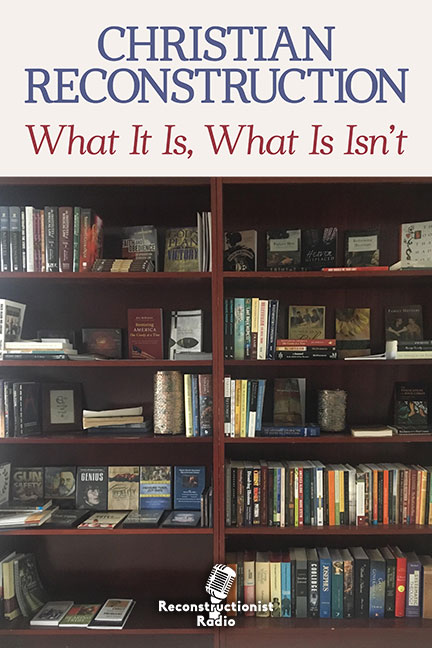
Part 2: Question 7: What About “Democracy”?
Gary North and Gary Demar
Narrated By: Daniel Banuelos & Devan Lindsey
Book: Christian Reconstruction: What It Is, What It Isn’t
Topics: Doctrinal Studies
Subscribe to the Audiobook
iTunes Google Spotify RSS FeedChapter Text
Do Christian Reconstructionists Reject Democracy?
Most Americans are under the impression that our nation is a democracy. To be sure, there are certainly democratic elements in our constitutional system. The First Amendment to the Constitution states that “the people” have the right “to petition the Government for a redress of grievances.” The petition of the people, however, is only as good as the character of the people. Keeping in mind the biblical doctrine of the depravity of man, our constitutional framers steered clear of a pure democracy. Constitutional attorney John W. Whitehead writes:
It must be remembered that the term democratic appears neither in the Declaration of Independence nor in the Constitution. Actually, when the Constitution is analyzed in its original form, the document is found to be a serious attempt to establish a government mixed with democratic, aristocratic, and monarchical elements – a government of checks and balances.[1]
A democracy places all power in the people. It is a government of the masses. Democratic law is based on the will of the majority. If the whims and fancies of the people change, the law changes.
John Winthrop declared democracy to be “the meanest and worst of all forms of government.”[2] John Cotton wrote in 1636:
“Democracy, I do not conceive that ever God did ordain as a fit government either for church or commonwealth. If the people be governors, who shall be governed?”[3] In the Federalist Papers (No. 10), Madison writes that democracies are “spectacles of turbulence and contention.” Pure democracies are “incompatible with personal security or the rights of property…. In general [they] have been as short in their lives as they have been violent in their deaths.”[4] Francis Schaeffer described law by majority opinion, certainly a definition of democracy, as “the dictatorship of the 51%, with no controls and nothing with which to challenge the majority.”[5] Schaeffer deduces a simple implication of this definition of democracy: “It means that if Hitler was able to get a 51% vote of the Germans, he had a right to kill the Jews.”[6]
Democracies degenerate into exploitation because some voters discover that they can vote themselves political and financial favors out of the public treasury. Those seeking power through majority rule always vote for the candidate promising the most benefits. The results are certain: democracies collapse because the public treasury is milked dry, due to greater voter demand. A dictatorship normally follows.
Actually, our constitutional government is a “republic,” a system in which the law, not the majority, is supreme. Democracies can degenerate into what Francis Schaeffer called the “tyranny of the 51%.” If whatever the majority wants becomes law, then a government will become oppressive of its minorities. If the will of the majority is the law, then an old majority can be overturned by a new majority. Hitler, it should be recalled, was elected to public office. Reconstructionists, on the contrary, press for the enforcement of God’s law, which requires just treatment of both the citizen and the “stranger,” the majority and the minority, because God has given one law for the people (e.g., Exodus 22:21; 23:9).
Finally, as Gary North has recently pointed out, “Christian reconstruction depends on majority rule.”[7] God uses lawful historical means to extend His earthly kingdom. Reconstructionists thus affirm that God’s laws should be passed and enforced according to the rules of the democratic process. Reconstructionists do not preach revolution or a top-down bureaucratic take-over. But Reconstructionists also do not believe that the will of the political majority is the final law in society. If this were the final law, then the will of the political majority would be the will of God. The democratic majority would then be God. What Christian could believe such a doctrine?
[1] John Whitehead, The Separation Illusion (Milford, MI: Mott Media, 1977), p. 47.
[2] Quoted in A Marvyn Davies, Foundation of American Freedom: Calvinism in the Development of Democratic Thought and Action (Nashville, TN: Abingdon Press, 1955), p. 11.
[3] Letter to Lord Say and Seal, The Puritans: A Sourcebook of Their Writings, 2 vols., eds. Perry Miller and Thomas H. Johnson (New York: Harper and Row, [1938) 1963), Vol. 1, pp. 209-10.
[4] 4. Alexander Hamilton, James Madison, and John Jay, The Federalist, ed. Jacob E. Cooke (Middletown, CT: Wesleyan University Press, 1961), p. 61.
[5] Francis A Schaeffer, The Church at the End of the Twentieth Century (Downers Grove, IL: InterVarsity Press, 1970), pp. 33f.
[6] Idem.
[7] Gary North, Political Polytheism: The Myth of Pluralism (Tyler, Texas: Institute for Christian Economics, 1989), p. 586.
